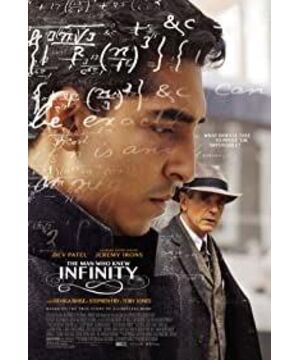The Man Who Knew Infinity is a moving film about the storied and turbulent life of Indian mathematician Srivanise Ramanujan (1887-1920). Although Ramanujan was born into a Brahmin family in India (the highest caste in Hinduism), because of his poor family background, he had little professional academic research training before going to the UK, and almost entirely relied on self-taught - in the movie, when he was in India He didn't even have scratch paper for calculations. Different from the academic emphasis on rationality and proof in the West, Ramanujan's mathematical research is almost completed by intuition. When his academic collaborator at Cambridge University and the famous mathematician Godfrey Hardy (1877-1947) asked him where his bizarre formulas came from, Ramanujan's answer was more than his mathematical The formula is even more bizarre: "This is what the goddess Namagiri put in my head, and she told me in my dreams. I just wrote down what she told me, it was a response to the gods. If it doesn't fit the will of the gods, then I Everything you do is pointless."
This has to be said to be a miracle. While Western mathematicians are still struggling to verify the correctness of a formula, Ramanujan has written two entire mathematical formulas in the city of Madrid, India, known as the "state of fools". . The proof of those formulas not only won several mathematicians the Fields Medal in the 20th century, but what is even more surprising is that in the age when human beings have not yet discovered black holes, Ramanujan has already written for humans to study black holes a hundred years later. formula to be used. In him, sensibility and reason are wonderfully combined, and the huge difference between him and Hardy makes this fusion show profound meaning in the early 20th century when racism was rampant.
At the beginning of the 20th century, India was still a colony of the Empire on which the Sun Never Sets, and the high-ranking Western colonists naturally despised the Indians who were defeated by themselves and allowed themselves to bully and plunder. In this context, Hardy invited Ramanujan to the then world-famous Cambridge University for academic research, even though he kept saying that he was an atheist and did not believe in the so-called mysterious oriental wisdom, but he was in the movie More than once I said to Ramanujan, "But I believe in you." If Ramanujan's mathematical research is a miracle, a white British man who does not believe in God, does not believe in human emotion, and does not believe in everything that cannot be controlled and proven by reason The near-blind belief of this intuition-based Indian academic is arguably an even greater miracle.
The difference between Hardy and Ramanujan is a very interesting highlight in the film. Hardy, a mathematician, keeps saying that he does not believe in God, is an atheist, and does not believe in emotion, because emotion cannot be verified or falsified, neither controlled by reason nor can there be any basis for existence. Therefore, in addition to mathematics, he don't believe in anything. And Ramanujan is completely different from Hardy: he devoutly believes in the goddess Namagiri, the wife of Vishnu, and believes that if his actions are not in line with God's will, it is completely meaningless; he also says more than once in the film that he has a Wife, and also expressed through various behaviors that he loves his wife very much.
Although there are many comments that it is inappropriate to forcibly insert a love scene in such a film about the legendary life of a mathematician because of box office considerations, I do not think so. On the contrary, in my opinion, the love between Ramanujan and Janaji is a very important element in this film and has the role of accentuating the theme. As mentioned above, Ramanujan's mathematical research is intuitive. He believes in divine revelation, feeling, love, and all irrational perceptions. Mathematics, as he and Janaki said, has color, it is the eye of the goddess, it is the wind of the goddess, and it is the meaning of life given to him by the goddess. And these words, he only said to Janaji, not even to Hardy, who was also his teacher and friend. why? Because in the movie, mathematics is like love for Ramanujan, and his research is driven by perception and intuition, and all of this is incompatible with Western academic thinking.
Since the scientific revolution, the West has formed a complete set of rigorous academic methods—emphasizing rationality, empirical evidence, reasoning, and logic. Western countries, whether in the field of natural sciences or in the fields of humanities and social sciences, have achieved great success. It has made great progress and has been at the forefront of the world in the field of science and technology since the pre-modern period. The progress of science and technology has also brought enormous political power and economic benefits to Western countries. With political power and economic interests, Western countries also have the right to speak, or the power to formulate the rules of the game. Therefore, until today, the academic circles all over the world are still adopting Western research methods and evaluation standards. Even if sometimes the academic research objects cannot be fully researched by Western standards, they must first make researches that can be researched by Western standards. Research later. The author once discussed this issue with a friend who studies Chinese classical literature in Europe. She said that many of the ancient Chinese knowledge cannot be studied with Western methods, and there are many comprehension terms that cannot be explained in Western languages. But now the rules of the game are not made by us, so we can only cut our feet and adopt their standards.
And this question, in the movie, also appeared in Ramanujan's academic career a hundred years ago. Because of his intuition over proof academic research, his research results cannot be published until he learns Western-style proofs. At the same time, his Indian identity is also known in the UK as a huge obstacle to his promotion to Trinity College. The ups and downs of his academic career are not only a tragedy under racism and colonialism, but also shrouded in the shadow of the huge difference between Eastern and Western ideology and culture.
Fortunately, he has an academic collaborator who claims that he does not believe in his feelings but almost blindly believes in him. Fortunately, his extraordinary talent can help him cross the gap between racism and colonialism, and take him to fly over the ideological and cultural fields of the East and the West. The huge difference eventually made him a member of the Royal Society, recognized by those arrogant white Westerners.
But all of this is probably the expectation of the worldly people - the worldly glory that only the godless people like Hardy can pursue, and for Ramanujan, who is a faithful believer of the goddess Namagiri, all he has done is nothing more than It was in response to what the goddess said to him, and only such purity could allow him to write mathematical formulas dedicated to the goddess that were completely beyond the era in which he lived.
Although Ramanujan died of tuberculosis at a young age—and because of his beliefs: maintaining a strict vegan diet in the dank conditions of England—he served his time and the generations that followed him. left an inexhaustible wealth. And as important as this wealth is that he has shown to future generations another possibility of doing academics that surpasses Western standards—intuition may not be able to surpass reason, and feeling may not be defeated by proof.
But in the end, Ramanujan died of tuberculosis - this mathematician who seemed to have crossed over from the 23rd century and had extremely religious beliefs practiced the oldest impermanence himself: he had the wisdom to illuminate the solar system, but To die is to use that wisdom to the best of your ability. The death of a mathematician is also a dream for him, to practice the will of God in the name of science, come naked, go naked, and end up in a white land that is really clean. It's just that there are still some people who are unwilling to the vast universe as small humans, and there are still some people who are deceased and have little attachment to eternity. Let's write a formula, and they will be as immortal as gods.
View more about The Man Who Knew Infinity reviews











